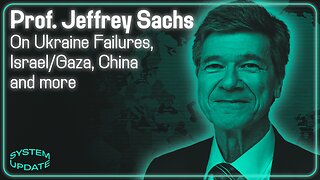The Growing Culture War with Konstantin Kisin
SHOW NOTES:
https://www.whatbitcoindid.com/podcast/the-growing-culture-war
Konstantin Kisin is a Russian-British satirist, podcaster, author and political commentator. In this interview, we discuss politics, freedom of expression, and the influence of American discourse on the UK. We also talk about the importance of rational and reasonable discussions, the challenges of self-censorship and the connection between economic issues and "wokeism".
THIS EPISODE’S SPONSORS:
Iris Energy - https://irisenergy.co/
Wasabi - https://www.wasabiwallet.io/
Ledn - https://www.ledn.io/
Ledger - https://www.ledger.com/
Unchained - https://unchained.com/
SUPPORT THE SHOW:
→ Become a Patron: https://www.patreon.com/whatbitcoindid/
→ Subscribe on iTunes
→ Leave a review on iTunes
→ Share the show out with your friends and family on social media
→ Drop me a line on hello@whatbitcoindid.com
→ https://www.whatbitcoindid.com/sponsorship/
TIMESTAMPS:
00:00:00 Introduction
00:07:01 Truth & free speech
00:15:44 Social media pitfalls
00:20:05 Debased discourse
00:31:26 Societal shift & family breakdown
00:41:05 Losing wisdom & purpose
00:48:25 Government vs freedom
WHERE TO FIND THE SHOW:
→ My website: https://www.whatbitcoindid.com/podcast/
→ iTunes: https://apple.co/2OOlzVV
→ Spotify: https://spoti.fi/2ygc4W1
→ Stitcher: https://bit.ly/2IQO8fX
→ SoundCloud: https://bit.ly/2CGSVQR
→ YouTube: https://bit.ly/3nyi9Ez
→ TuneIn: https://bit.ly/2ywystr
LISTEN TO OLD EPISODES:
→ By guest: https://www.whatbitcoindid.com/guests/
→ By topic: https://www.whatbitcoindid.com/topics/
→ Transcriptions: https://www.whatbitcoindid.com/transcriptions/
WHERE TO FOLLOW ME:
→ Twitter: https://twitter.com/whatbitcoindid/
→ Medium: https://medium.com/@whatbitcoindid/
→ Instagram: http://instagram.com/whatbitcoindid/
→ Facebook: https://www.facebook.com/whatbitcoindid/
→ YouTube: https://www.youtube.com/whatbitcoindidpodcast
→ Website: https://www.whatbitcoindid.com/
→ Email list: https://www.whatbitcoindid.com/subscribe/
LEARN ABOUT BITCOIN:
→ Step by Step Guide: https://www.whatbitcoindid.com/learn-bitcoin
→ Training: https://www.whatbitcoindid.com/training/
→ Resources: https://www.whatbitcoindid.com/resources/
#Bitcoin #Finance #Economics
****
“Freedom has tradeoffs, freedom will mean you’re less safe and freedom will mean that some people will say things you don’t like; I’m okay with that, because I don’t want to live in totalitarian China and I don’t want to live in Soviet Russia, if you do fine that’s fine, go there and live there.”
— Konstantin Kisin
Konstantin Kisin is a Russian-British satirist, podcaster, author and political commentator. In this interview, we discuss politics, freedom of expression, and the influence of American discourse on the UK. We also talk about the importance of rational and reasonable discussions, the challenges of self-censorship and the connection between economic issues and "wokeism".
- - - -
Cancel culture, the practice of publicly shaming or boycotting individuals or organizations deemed to have said or done something objectionable is a phenomenon that has gained prominence in recent years. The exact beginnings of cancel culture are hard to pinpoint, as public backlash and boycotts have occurred throughout history. However, the rise of social media platforms in the late 2000s and early 2010s significantly amplified cancel culture's influence.
The problem is the impact cancel culture has in shaping societal discourse and accountability. Supporters view it as a way to hold people responsible for their actions, promote social justice, and challenge systemic issues. They argue that cancelling figures or entities who promote harmful ideas helps to create a more inclusive and equitable society. It can also serve as a form of empowerment for marginalized groups.
And yet, cancel culture has faced strong and growing criticism in recent years for its significant negative impacts. The practice often lacks nuance or fairness, leading to disproportionate consequences for minor offences or misunderstandings without due process. Further, it fosters a culture of fear and self-censorship, as individuals may be afraid to express unpopular opinions or engage in critical discussions for fear of being cancelled.
Perhaps the most minacious consequence is that cancel culture can lead to further polarization in society as people retreat into echo chambers and become more resistant to differing viewpoints. The effect is to critically hinder open dialogue and mutual understanding. Rather than engaging in constructive dialogue, people are being prevented the opportunity to engage in rational and reasonable debate. If we want to remain free we must be prepared to be offended.
-
 1:00:55
1:00:55
What Bitcoin Did
2 days agoHow Bitcoin Changes the World with NVK
2071 -
 27:05
27:05
TudorDixon
14 hours agoSetting Our College Campuses Straight with Rep. Virginia Foxx | The Tudor Dixon Podcast
27.6K70 -
 1:39:37
1:39:37
The Anthony Rogers Show
13 hours agoEpisode 311 - New Science of Epigenetics
31.8K10 -
 24:43
24:43
DepressedGinger
14 hours ago"REALISTIC" Official 2024 US Election *Trump vs Biden* UPDATE
19.9K7 -
 1:41:27
1:41:27
Fresh and Fit
8 hours agoA Fresh Match With Fresh&Fit Ft. Rollo Tomassi & Michael Sartain
82.7K96 -
 21:35
21:35
Stephen Gardner
5 hours ago🔴Biden FACES CRISIS as Pentagon LEAKS HORRIBLE NEWS!
42.8K88 -
 1:12:46
1:12:46
Glenn Greenwald
8 hours agoINTERVIEW: Professor Jeffrey Sachs on Ukraine's Failures, Israel's War in Gaza, China, and More | SYSTEM UPDATE #271
80.7K221 -
 1:00:24
1:00:24
The StoneZONE with Roger Stone
10 hours agoIT'S ON: Roger Stone Handicaps the Upcoming Clash Between Donald Trump and Joe Biden - The StoneZONE
51K6 -
 1:43:34
1:43:34
Clownfish TV
12 hours agoSquare-Enix RESETS, Helldivers 2 Drama, Consoles vs. PC | CTRL+STREAM+DEL Livestream #03
38.1K6 -
 1:40:39
1:40:39
The Quartering
15 hours agoTrump Biden Debate 2024 Insanity, Biden Border Panic, More Bridges Hit,
61.4K15